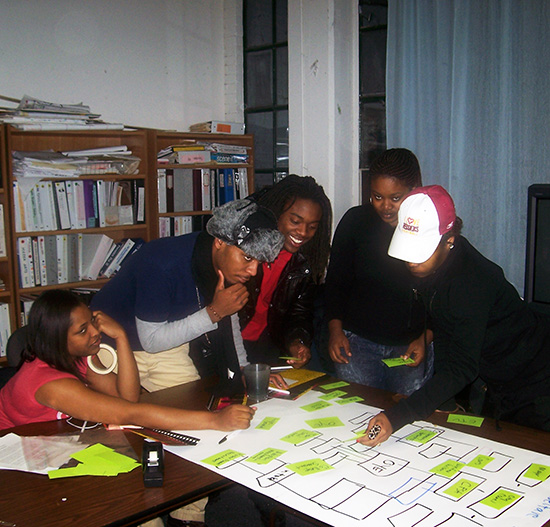
Led by youth and adults working together since 1999, the Foster Care Campaign (FCC) employs, trains, and supports 35-50 foster, emancipated, and homeless youth each year (ages 15-24) who work to improve educational options, improve living conditions, decrease youth poverty, and expand youth rights. YWP provides the training, advocacy, and system navigation support that enables individual youth to strengthen their problem solving and communication skills, expand their support networks, and learn how to use their own power and resources. Most of our youth experience significant personal growth and overcome many obstacles--improving their living conditions, graduating high school, enrolling in college, building healthy relationships, and moving into the full time workforce. They use their life lessons and advocacy skills to advocate for system wide changes.
During the past three years, FCC has successfully worked to achieve three goals for youth in care: 1) Improve living conditions in group homes and Individual Learning Plans (ILPs); 2) Expand, codify, and enforce a bill of rights for DC foster youth and 3) Increase financial resources and access to food, clothing, transportation for older youth. We are still working to increase the number of foster youth who secure living wage jobs and the number who are prepared for and enroll in college.
We will continue pursuing these goals through the following objectives:
Objective 1: Build the leadership capacity and holistic development of 30 youth staff leaders so that they can improve their own lives and advocate for system changes in rights, employment, education, and economic wellbeing, and educate their peers through communication and outreach. FCC youth staff work more than 300 hours and receive more than 150 hours of training and coaching in Core Skills (education, health, work readiness, self-advocacy, finance, conflict resolution, and navigation) and Advanced Skills (training, policy and advocacy, communications, research, education, membership). FCC staff members work on personal and system obstacles through weekly self-advocacy emails to social workers, Guardians ad Litem (GALs), and agency leaders to document problems they are having and request resources. To address collective common problems, youth work on Youth Advocacy Action Teams to identify problem sources, develop action plans, identify options and resources, and take action.
Objective 2: Build the navigation capacity, access to rights, resource networks, and voice 500 foster, homeless, and at-risk youth and engage them as advocates through communications and social media. This year, YWP is broadening our outreach strategy to focus on web-based resources and social-media based education. Right now, if you are a youth who is in foster care, homeless, or on your own without family resources -- there is no website that provides detailed information or guidelines for how to get services and support in education, employment, and housing. This website, the result of two years of adult-youth design and copy development, provides: 1) Information about rights, programs, opportunities, laws, user guides, and what you need to know to understand the issues and advocate for your rights; 2) Resources that include health services, employment opportunities, education programs, housing, and other support options; and 3) Action: Youth can send emails to agency staff and government leaders, contribute to YWP campaigns, and connect with other advocacy actions and organizations across the city. FCC staff and members will use Twitter, Instagram, and other social media to connect with 500 youth and direct them to our website. The FCC youth communications team writes blogs, interviews city leaders and front-line workers, and write news stories.
Objective 3: Provide ongoing support, technical assistance, and advocacy to CFSA and outreach to youth to ensure that YWP policy initiatives are fully implemented. YWP’s 2011-13 advocacy work resulted in the passage-approval of four new older youth policies including the Foster Youth Rights and Responsibilities Amendment Act that includes 47 rights, the Foster Youth Transit Subsidy Amendment Act that requires subsidized public transportation to foster youth ages 19 and 20, and a mandatory allowance and clothing voucher policy. YWP staff and youth continue to monitor these policies and work with CFSA and contractors to ensure youth have full access to these policies.
Objective 4: Expand youth rights and opportunities through new assessment, research, and policy development. Each year, FCC youth staff work on a range of research and advocacy projects in order to assess institutional problems, integrate youth into city-level decision making, and develop and move pro-youth policies. Moving these projects forward requires working closing with agency and executive level staff and leaders and nonprofit partners. As part of this work, YWP youth and adult staff prepare and deliver more than 50 testimonies each year as part of the Agency oversight and budget development process. FCC staff also field research -- which combines data collection by youth that includes youth interviews, spy calls, and site visits with budget analysis, program assessment, and other publically available data. These studies seek to answer questions about youth accessibility and service delivery. In both cases, we did not publically disseminate the field studies, but instead circulated them to key officials and used this work to identify needed system changes.


